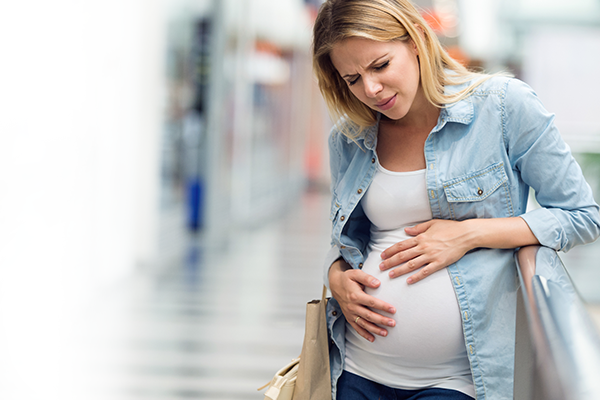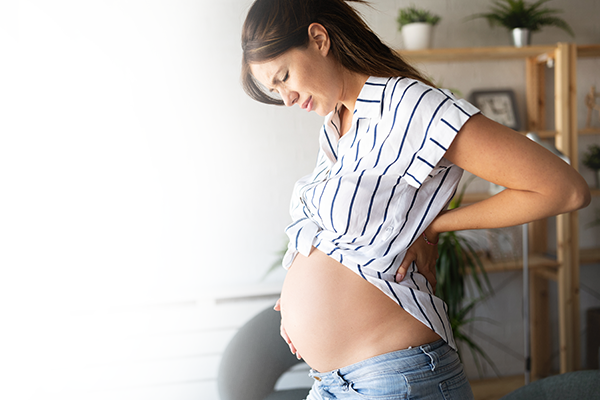A hard abdomen can indeed be a symptom of impending labor. It is then triggered by the so-called Braxton-Hicks preterm labor, but this is not the only cause. During the waiting period, the expectant mother's organism is constantly changing and symptoms appear that the woman has never experienced before. What can a hard belly in pregnancy indicate and when is it a cause for concern?
Is hardening of the abdomen normal during pregnancy?
Expectant mothers expecting the birth of their first child often wonder whether their belly should be hard or soft. Meanwhile, a lot depends on what stage of development the child is in. However, there are times when it should be considered a signal to consult a specialist. While it is a normal condition before birth, hardening of the abdomen should not occur at the beginning of pregnancy. If additional worrisome symptoms occur, such as spotting, pregnancy bleeding and pain, be sure to see a pregnancy specialist, as they may indicate preterm labor or miscarriage. A hard abdomen should prompt the expectant mother to see her gynecologist, especially if the symptoms occur before 30 weeks of pregnancy. They may also indicate abnormalities at later stages. However, the expectant mother should not panic, but simply make an appointment.
Towards the end of pregnancy, a hard abdomen is usually a symptom of preterm labor, which indicates that labor is about to begin. Braxton-Hicks contractions are characterized by the fact that they are not painful, but regular and last about 30 seconds. They occur several times a day. They begin in the upper abdomen and gradually descend. Apart from the above-mentioned hardening of the abdomen, they are not accompanied by other symptoms. In this way, the uterus is prepared for birth, but also the baby’s muscles are stimulated.
How to deal with a hard abdomen during pregnancy?
When the hard lower abdomen is triggered by inguinal hernia cramps, it can be uncomfortable for the expectant mother. How to deal with unpleasant symptoms? First of all, the expectant mother should rest. The discomfort is similar to that during menstruation. Therefore, all relaxation techniques, gentle stretching and relaxation exercises and a warm bath will help. Just remember that too hot water is not advisable. A correct breathing technique and observing your own body are essential. Changing position also usually helps. If the abdomen hardens while walking, rest brings relief. On the other hand, if the discomfort worsens while lying down, light exercise will probably help. It’s also important to stay well hydrated, which means drinking at least two liters of water a day. It is a good idea to develop this habit, as dehydration is not good for the mother or the baby.
In some cases, if the discomfort is very distressing, the doctor may prescribe safe diastolic medication or encourage you to take supplements, such as magnesium.
When is a hard belly a cause for concern?
A hard pregnancy belly without contractions, if it bothers you in the third trimester of pregnancy, can be a symptom of stomach problems, especially indigestion. The enlarging uterus begins to press on the internal organs, intestinal peristalsis is hindered and the expectant mother often complains of problems with bowel movements. One of the symptoms of constipation is a hardened abdomen. In such situations, adequate fluid intake and proper nutrition are crucial, especially the consumption of high-fiber meals that improve bowel function and protect the delicate mucosa from irritation. The cause of a hard abdomen is sometimes also excessive stress, so the expectant mother should take care not only of her physical well-being, but also of her mental well-being.
A hard abdomen is a worrisome symptom in the first trimester. While in the third month it is a natural condition of what is called the erection of the uterus, in the first few months after conception it can be an indication of placental abruption or even miscarriage. Most miscarriages are recorded by the 14th week of pregnancy, so if there are troubling symptoms, the doctor will order another ultrasound.
In the second trimester, the risk of miscarriage is lower, although the expectant mother may still feel hardening of the abdomen as the baby moves and changes position more frequently. Discomfort may also occur after sexual intercourse if the cervix becomes irritated. In the third trimester, a hard abdomen and lack of movement of the baby is a signal to see a pregnancy specialist as soon as possible. There is a risk that the baby is caught in the umbilical cord, which is an indication for a cesarean section. Since the expectant mother’s organism is constantly changing, she should not be afraid that her questions will be considered inappropriate by the doctor. The gynecologist will do everything to make both the mother and her unborn child feel comfortable and safe.










